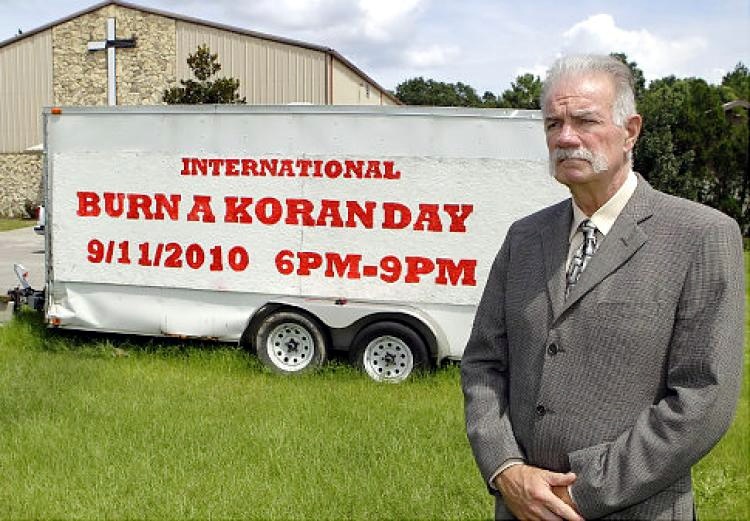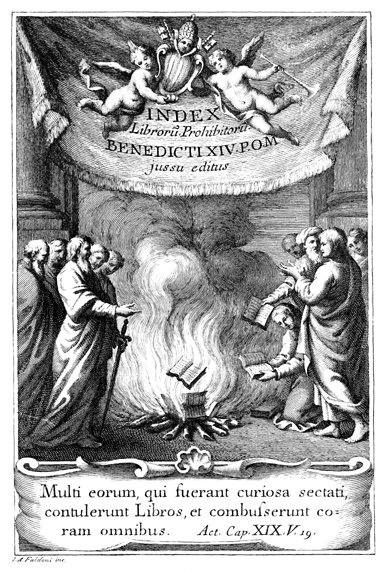| By: Paul S. Cilwa | Viewed: 4/20/2024 Posted: 9/10/2010 |
Page Views: 6382 | |
| Topics: #FundamentalistChristians #BookBurnings #History | |||
| Let's look at the history of book burnings. | |||

There's been a lot of talk lately about burning books. Specifically, a Christian extremist, Terry Jones, threatens to burn copies of the Qur'an, the Moslem holy book. (He can't spell it correctly, but that's the least of our concerns.) This has come on the heels of an uproar over an Islamic Community Center proposed to be built a few blocks from the site of the former World Trade Center in Manhattan. Both issues are clearly matters of freedom of speech and religion; but have been characterized as something legal to do, but not necessarily wise to do. So I thought it might be interesting to ponder the significance of book burnings in general, and how that significance has changed through the years.
The earliest books were written by Sumerians on clay tablets. While they could be broken, even pulverized, burning was out of the question. It wasn't until the popular medium for writing switched to papyrus or similar materials that burning even became possible.
Early "books" were actually scrolls, but conceptually were the same: A medium in which a larger idea could be proposed, developed, and examined in a relatively convenient manner. Marking one's place in a scroll, to facilitate easy return to where one left off, was even easier than with bound books: It could simply be left partially unwound.
The earliest documented book burning occurred in China, beginning in 213 BCE. Emperor Qin Shi Huang ordered the burning of all philosophy books and history books from states other than Qin. He then followed that up by burying any non-compliant book owners alive. But Karma's a bitch. Huang's son, Qin Er Shi, ruled only a short while before he was deposed, during which the imperial palace and state archives were burned, thus destroying most of the remaining written records that his father had spared. The result was a staggering loss of Chinese culture. (For example, there may have been earlier book burnings—we don't know, because the histories were destroyed.
Around 50 CE, a Roman solider publicly burned a Torah, the sacred text of the Jews (the first five books of what we call the Old Testament). This was certainly equivalent to what the Reverend Terry Jones proposed doing tomorrow, minus worldwide television coverage. Even without so much publicity, the resulting uproar came so close to causing a revolution (such as occurred 20 years later anyway) that the only way Procurator Cumanus could appease the Jewish populace was by beheading the culprit.

In the aftermath of the First Council of Nicaea, existing copies of the Bible were gathered and burned, and replaced by "new" copies that had been "corrected" by the bishops at the council, under the "guidance" of Emperor Constantine. It's widely believed that most references to reincarnation were excised from Christian belief in this way.
When the Catholic conquistadors reached Yucatan, they promptly burnt the books of the Mayas. Aztec books were burnt not long after.
So, in burning books presenting the wisdom of another religion, Reverend Terry Jones is in good company.
But why burn books?
Fear.
When a person possesses beliefs that, deep inside, he or she knows aren't logical or defensible, there is nothing more feared than knowledge…and books contain knowledge.
The very phrase "forbidden knowledge" raises my hackles, because I firmly believe that no knowledge should ever be "forbidden". To do so has but one purpose: To give power to those who possess the knowledge already, and to withhold it from those who don't.
Fortunately, in the world of today, book burnings have no teeth. Jones can burn a dozen Qur'ans, or a thousand—but he cannot burn them all. All he would have succeeded in doing is giving money to a Qur'an publisher for copies that wouldn't otherwise have been sold. Not a single Qur'an would be taken from a person who wanted one.
And what's to fear in the Qur'an? Nothing, really. I've read it. But I can see how the promoters of a world of terror (that is, those who make money from dividing us from them and keeping both sides in fear of the other) would not want any Christians reading this holy book of the Moslems. After all, if they did, among other things they would learn that the word jihad does not mean "holy war" as we've been told and told and told it does. Jihad is simply a person's struggle with his own inner demons. While the Qur'an is not an easy read, it is, overall, a book of peace—with no more or less violence than in the Christian Bible, with its adulteries, mass murders, and child endangerment.
But if Terry Jones had known that, he'd have never gotten his fifteen minutes of fame on the teevee. Or the presumably huge influx of donations from his fearful and ignorant followers.





